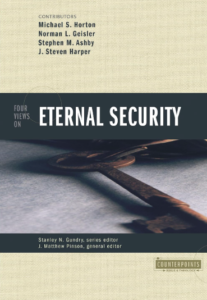
Author: Gundry, Stanley
Genre: Theology - Soteriology
Tags: Doctrine / Theology
Series: Counterpoint Series
Rick Shrader‘s Review:
Reading on Eternal Security is basically reading on Sanctification and Perseverance. The main question is whether one can lose his salvation or whether he will persevere to the end and be finally saved. However, this also must include, at least to some degree, how a person views Calvinism and Arminianism and the related doctrines. The book, therefore is complicated enough to learn a lot and also interesting enough to make one read to the end. The four views are, a Classical Calvinist view by Michael S. Horton; a Moderate Calvinist view by Norman L. Geisler; a Reformed Arminian view by Stephen M. Ashby; and a Wesleyan Arminian view by J. Steven Harper.
The Classical Calvinist view (which can be fairly broad within Calvinism) is that the believer is predestined to persevere in his faith as much as he is also predestined to be saved. This is perseverance of the saints, the fifth point of Calvinism. This, then, is to hold to eternal security for the elect but also includes the possibility of hypocrites who were never saved and therefore will fall away (which leaves the door open for a lack of assurance as to whether one’s life proves he is elect). The Moderate Calvinist view places the emphasis of eternal security on the salvation experience or the acceptance of Christ (though elect according to foreknowledge). The believer is eternally secure based on the promise of eternal life received at his reception of the gospel and will therefore persevere throughout life. There is much emphasis here on loss of reward for sin in the Christian life rather than losing salvation because of sin. There is also the possibility of hypocrites professing Christ but who have never been truly born again.
The two Arminian positions both deny eternal security but the loss of salvation is for different reasons. Ashby contends that the Reformed Arminian position was actually the position of James Arminius. Of course Arminius was originally a Reformed believer and maintained much of his Reformed views throughout life. However, he departed the full Reformed position over Perseverance. In this view one can lose salvation through a lack of faith, i.e., a believer is saved by freely choosing Christ by faith but never loses his free will ability to give his salvation back. Ashby says, it is possible for one who came into Christ by faith to exit by the same door. However, once a person does this, it is impossible to renew that person again to faith. This differs from the Wesleyan Arminian view which is the more known view that though a person may accept Christ by faith, sin in the believer’s life causes him to lose salvation. In this view, the person can be, and usually is, restored (saved) again by asking Christ for forgiveness. This may take many times in a person’s life.
Even with such divergent views, the authors maintained a good spirit among them and made the book easy to read the various views. I maintain a Moderate Calvinist view with eternal security and also assurance based on the clear commands and promises of the Word of God.
